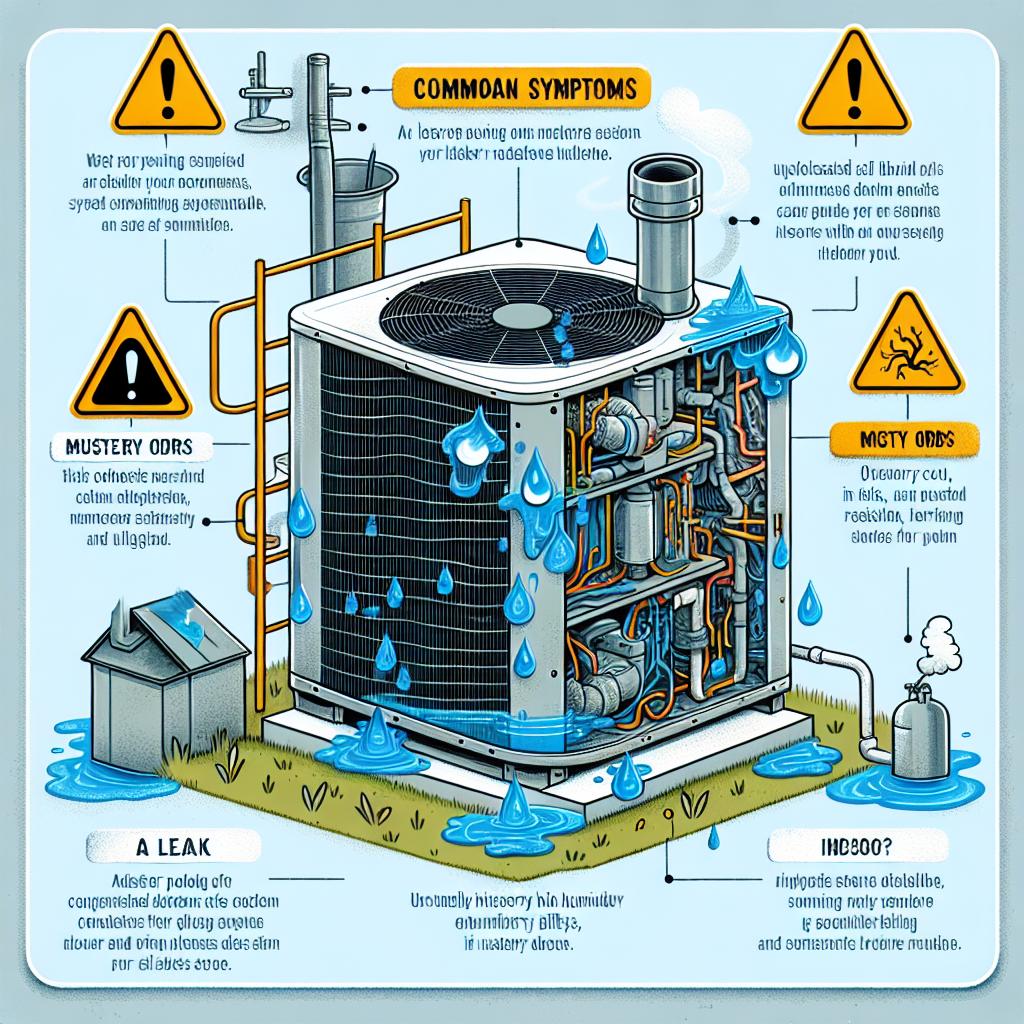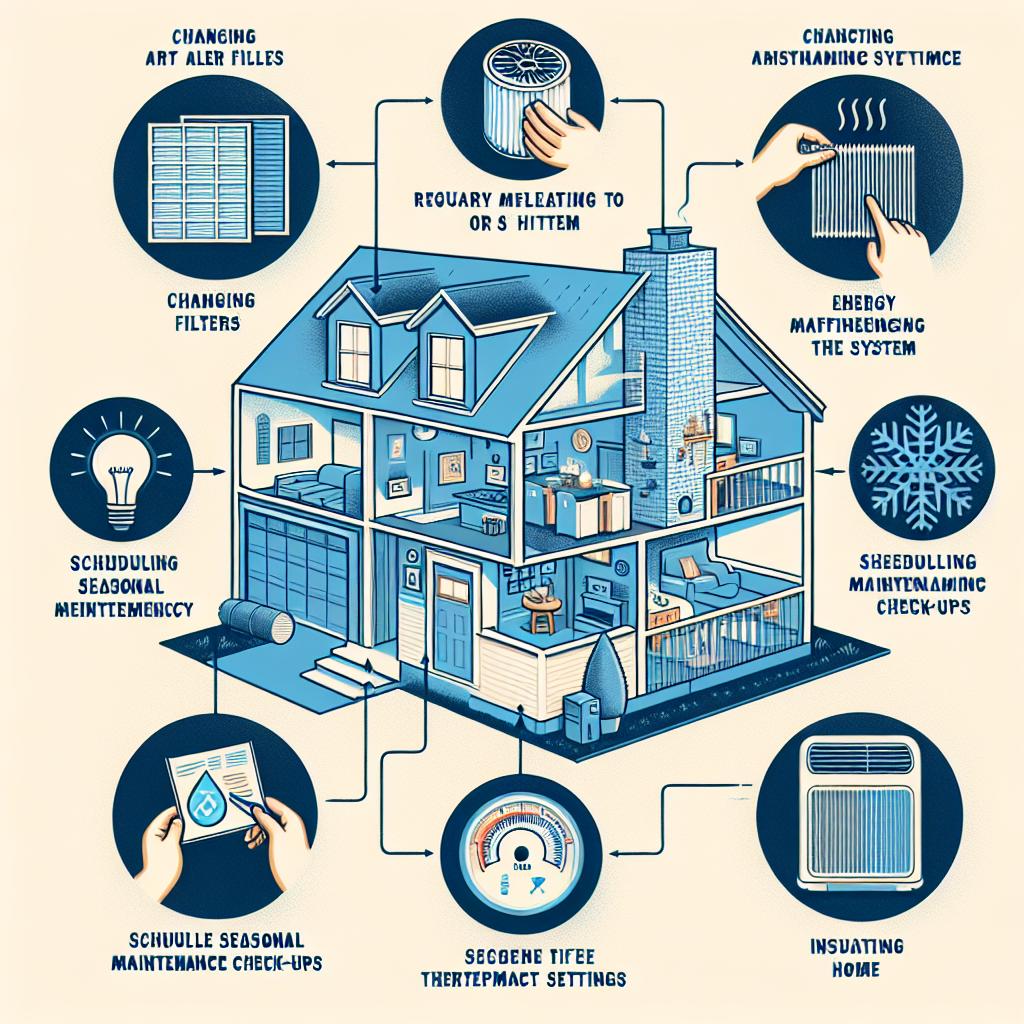As the sweltering heat of summer sets in, millions of households and businesses seek refuge in the cool embrace of air conditioning. While these modern marvels provide much-needed relief from soaring temperatures, an overlooked question looms in the background: Does the overuse of air conditioning contribute to leaks in HVAC systems? This article delves into the intricate relationship between excessive cooling and the potential deterioration of HVAC components. By exploring the factors at play, from moisture accumulation to system strain, we aim to shed light on how our quest for comfort may inadvertently affect the integrity of our climate control systems. Join us as we navigate this delicate balance between comfort and maintenance, uncovering the hidden truths behind HVAC performance in our air-conditioned world.
Understanding the Connection Between Air Conditioning Overuse and HVAC Leaks
Excessive use of air conditioning can significantly impact the integrity of your HVAC system, often leading to unforeseen leaks. When the air conditioning unit operates continuously, it places an immense strain on the components, particularly the seals and ducts. Over time, this relentless operation can cause wear and tear, resulting in cracks or breaks in the system. Symptoms of these issues include noticeable temperature fluctuations, increased energy bills, and unusual noises that can indicate potential leaks.
Moreover, the relationship between air conditioning overuse and leaking systems is compounded by factors such as humidity and temperature differentials. High humidity levels can condense on cold surfaces, increasing moisture in the air ducts, which can exacerbate or reveal existing leaks. Addressing these issues promptly can help maintain efficiency and prevent further damage. Consider the following factors when assessing your HVAC system:
- Age of the system: Older HVAC units tend to be more susceptible to leaks.
- Maintenance history: Regular servicing can mitigate wear and tear.
- Installation quality: Poor installation can lead to structural weaknesses.

Identifying Signs of Potential Leaks in Your HVAC System
When your HVAC system is overworked, particularly due to excessive use of air conditioning, it can lead to various issues, including potential leaks. These leaks can significantly compromise the efficiency of your system. Look out for the following signs that might indicate a leakage problem:
- Unusual Energy Bills: A noticeable spike in your energy expenses might suggest that your system is struggling to maintain temperature due to escaping air.
- Inconsistent Temperatures: If some rooms are excessively cool while others remain warm, it could signal that conditioned air is escaping through leaks.
- Strange Sounds: Hissing or whistling noises can indicate air escaping from ducts that have become loose or damaged.
In addition to the visual and auditory cues, you can perform a proactive check on your HVAC system by considering the following steps:
- Visual Inspection: Examine the ductwork for any visible gaps or disconnected sections.
- Check for Moisture: Look for any condensation or pooling water around your HVAC components, which may indicate a leak.
- Utilize a Smoke Pencil: This tool can help you detect air movement in areas where it shouldn’t be present, making leaks easier to identify.

Preventative Measures to Maintain Your HVAC Efficiency
Keeping your HVAC system running smoothly doesn’t just depend on how often you use your air conditioning unit; it also hinges on regular preventative maintenance. One of the key practices to ensure efficiency is to routinely change or clean the air filters. Clogged filters restrict airflow, forcing the system to work harder and potentially leading to more significant issues, including leaks. Additionally, regularly inspecting and cleaning the evaporator and condenser coils will help maintain optimal heat exchange and prolong the life of your unit.
Moreover, sealing any ductwork leaks is essential for maximizing efficiency. Leaky ducts can lead to a loss of conditioned air, causing your HVAC system to overcompensate, which may result in overheating or premature wear and tear. Implementing measures such as insulating ducts and checking for and repairing any gaps will improve system performance. Here are a few more tips to enhance HVAC efficiency:
- Schedule regular professional inspections to catch issues early.
- Utilize a programmable thermostat to optimize usage and minimize unnecessary cooling.
- Maintain proper landscaping to provide shade for outdoor units.

Best Practices for Responsible Air Conditioning Use
To ensure efficient and responsible use of air conditioning, it’s essential to focus on a few best practices that optimize performance while minimizing potential damage. One effective approach is to maintain the desired temperature setting at a reasonable level, typically between 72°F to 78°F (22°C to 26°C). This range provides comfort while reducing the strain on the unit. Additionally, using programmable thermostats allows homeowners to adjust settings during non-peak hours, which can enhance energy efficiency. Regularly cleaning or replacing filters is crucial as well, since dirty filters can obstruct airflow and contribute to unnecessary wear and tear, potentially leading to leaks in the HVAC system.
Proper ventilation is also a pivotal aspect of responsible air conditioning use. Ensuring that the space is adequately ventilated helps to prevent excessive moisture buildup, which can cause condensation issues. Here are some effective strategies:
- Schedule regular maintenance checks to spot potential issues before they escalate.
- Avoid over-cooling by dressing appropriately for the temperature and using ceiling fans to circulate air.
- Seal windows and doors to keep cool air in and hot air out, further enhancing system efficiency.
Q&A
Q&A: Does Overuse of Air Conditioning Cause Leaks in HVAC?
Q1: What are the main functions of an HVAC system?
A1: HVAC stands for Heating, Ventilation, and Air Conditioning. Its primary functions are to regulate indoor temperature, control humidity, and maintain air quality. This system ensures that a building remains comfortable in varying weather conditions.
Q2: How does air conditioning work in an HVAC system?
A2: Air conditioning units work by circulating refrigerant through a closed loop system. The refrigerant absorbs heat from indoor air and expels it outside, thereby cooling the indoor environment. This process continues until the desired temperature is reached.
Q3: What happens when air conditioning is overused?
A3: Overuse of air conditioning can lead to various issues. The system may become overworked, leading to wear and tear on components. This excessive demand can increase the likelihood of breakdowns and might reduce the system’s overall efficiency, causing parts to fail prematurely.
Q4: Can overusing air conditioning lead to leaks in the HVAC system?
A4: Yes, overuse can be a contributing factor to the development of leaks. When an HVAC system is continuously running at maximum output, it can strain components, leading to issues like refrigerant line leaks or damage to seals and joints. These leaks compromise the efficiency of the system and can lead to higher energy costs.
Q5: What are the most common types of leaks associated with HVAC systems?
A5: The most common leaks in HVAC systems are refrigerant leaks, which occur in the refrigerant lines. Additionally, ductwork can develop leaks due to poor installation or deterioration over time, causing conditioned air to escape and making the system work harder.
Q6: How can air conditioning overuse be managed to prevent leaks?
A6: To manage air conditioning usage and prevent leaks, homeowners can implement a few strategies. Regular maintenance, including cleaning filters and scheduling professional inspections, can help keep the system in good shape. Using programmable thermostats and setting higher temperature thresholds can also reduce strain on the system.
Q7: When should a homeowner be concerned about potential leaks?
A7: A homeowner should be concerned about potential leaks if they notice a significant rise in energy bills, hear unusual sounds from the HVAC system, experience inconsistent temperatures indoors, or find moisture around the unit or inside ducts. Early detection can prevent further damage and costly repairs.
Q8: Are there preventative measures to reduce the risk of leaks?
A8: Yes, preventative measures include regular maintenance checks, ensuring proper insulation of ductwork, and ensuring that the system is appropriately sized for the space it serves. Installing high-efficiency filters and keeping air vents unobstructed can also contribute to reducing the system’s workload.
Q9: What should a homeowner do if they suspect a leak in their HVAC system?
A9: If a homeowner suspects a leak, it’s advisable to contact a qualified HVAC technician. They can diagnose the issue, check for refrigerant leaks, and evaluate the overall health of the system. Timely professional intervention can save both energy and money in the long run.
By understanding how air conditioning works and the potential impacts of overuse, homeowners can make informed decisions to maintain their HVAC systems effectively while keeping leaks at bay.
Closing Remarks
while the allure of a perfectly cooled sanctuary during the sweltering months is undeniable, the relationship between air conditioning overuse and potential leaks in HVAC systems is a nuanced one. As we’ve explored, excessive or improper use of air conditioning can indeed strain systems, leading to efficiency losses and—even more critically—leakages that compromise indoor air quality and energy consumption. By understanding the importance of balance and regular maintenance, homeowners can ensure their HVAC systems operate optimally, safeguarding their comfort while minimizing the potential downsides of overuse. So, as you reach for that thermostat dial, consider not just your immediate relief from the heat, but also the health of your HVAC system and the environment it serves. After all, a cool home is a happy home, but a well-maintained HVAC system makes for a sustainable one.


One thought on “does over use of air conditioning cause leaks in hvac”